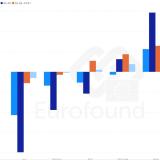
Zapošljavanje i tržišta rada
Zapošljavanje i tržišta rada čine jednu od šest glavnih aktivnosti u programu rada Eurofounda za razdoblje 2021. – 2024. Eurofound će nastaviti djelovati kao centar stručnosti za praćenje i analizu kretanja na tržištu rada, posebno sada kada se europska tržišta rada suočavaju s velikim izazovima uslijed pandemije bolesti COVID-19. Aktivnosti prikupljanja podataka i istraživanja bit će usmjerene na posljedice koje je pandemija imala na rad i zapošljavanje, ali i na pitanje kako održati funkcioniranje i uključivost tržišta rada.
U razdoblju od 2021. do 2024. istraživanje koje će provesti Eurofound pružit će važan uvid u izazove i izglede u području zapošljavanja i tržišta rada u EU-u. Eurofound ima važnu ulogu u praćenju trendova na tržištu rada, ali i u praćenju utjecaja tih trendova na različite skupine radnika.
Istraživanje će se uglavnom usmjeriti na promjenjivu strukturu tržišta rada s pomoću dokazanih Eurofoundovih instrumenata za praćenje, odnosno Europskog centra za praćenje poslova (EJM) i Europskog centra za praćenje restrukturiranja (ERM), uz podatke Eurostata. Budući da se u nekim zemljama, regijama, sektorima i zanimanjima očekuje visoka stopa nezaposlenosti, koja utječe i na radnike s najnesigurnijim radnim uvjetima i najosjetljivije skupine radnika, tim će se instrumentima pomoći utvrditi u kojim se sektorima, zanimanjima i kvalifikacijama bilježi rast, a u kojima pad. Osim toga, Europski centar za praćenje restrukturiranja nastavit će ispitivati velika restrukturiranja , zakonodavne instrumente i instrumente potpore, kao i mjere koje razvijaju socijalni partneri i javna tijela kako bi se radnicima pomoglo pri prelasku na drugo radno mjesto ili u drugi sektor.
Eurofound će se usredotočiti i na nedostatke radne snage i nedovoljno iskorištene ljudske resurse i sposobnosti u određenim sektorima i zanimanjima, koji su naglašeniji zbog pandemije bolesti COVID-19, istražujući intervencije politike i prakse poduzeća. Konkretne teme uključivat će neprilagođenost vještina , radno vrijeme , geografsku ili profesionalnu mobilnost te integraciju migranata , a obuhvatit će se i skupine koje su nedovoljno zastupljene na tržištu rada, kao što sumladi, žene i osobe s invaliditetom . Eurofound će se posvetiti i sektorima koji se redovito susreću s nedostatkom radne snage jer zbog pandemije taj problem zahtijeva što hitnije djelovanje. Ta će aktivnost pridonijeti pripremnom radu na sljedećem izdanju Europskog istraživanja o poduzećima (ECS) .
Nastavit će se i suradnja Eurofounda i Zajedničkog istraživačkog centra (JRC) Europske komisije u tom području. Istraživanje o restrukturiranju pridonijet će aktivnostima Europskog fonda za prilagodbu globalizaciji i Europskog socijalnog fonda plus (ESF+). Istražit će se poveznice sa srodnom agencijom Cedefop i Europskim nadzornim tijelom za rad kad je riječ o vještinama i mobilnosti radne snage u kontekstu politika zapošljavanja usmjerenih na rješavanje problema nedostatka radne snage.
- Infografika: Zapošljavanje i tržišta rada EU-a
Šezdeset posto osoba i dalje je zaposleno na temelju ugovora na neodređeno vrijeme. Iako se podatci kojima raspolažemo u pogledu „nestandardnog rada”, odnosno rada na nepuno radno vrijeme i na određeno vrijeme, nisu znatno mijenjali u posljednjih pet do deset godina, oni prikrivaju pomake na nesigurnije oblike rada, a osobe s nesigurnim ugovorima nemaju jednak pristup zapošljavanju i socijalnoj zaštiti.
Tina Weber, voditeljica istraživanja, Jedinica za zapošljavanje







































